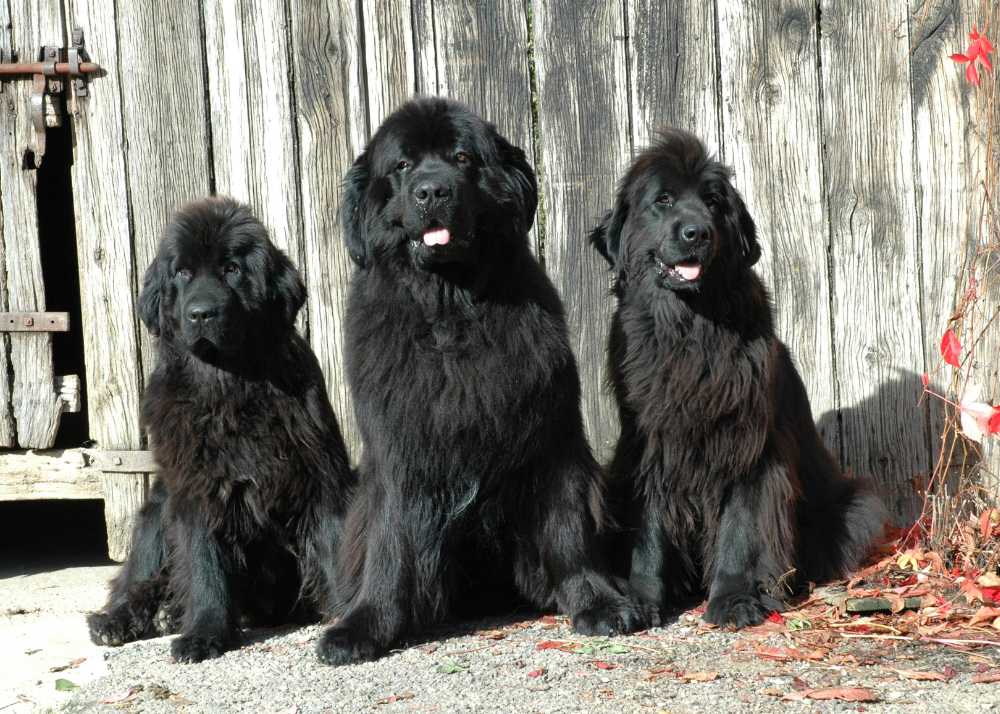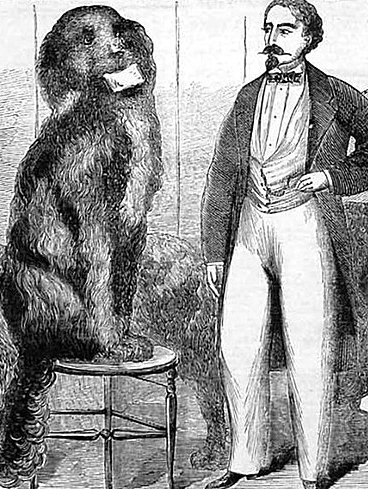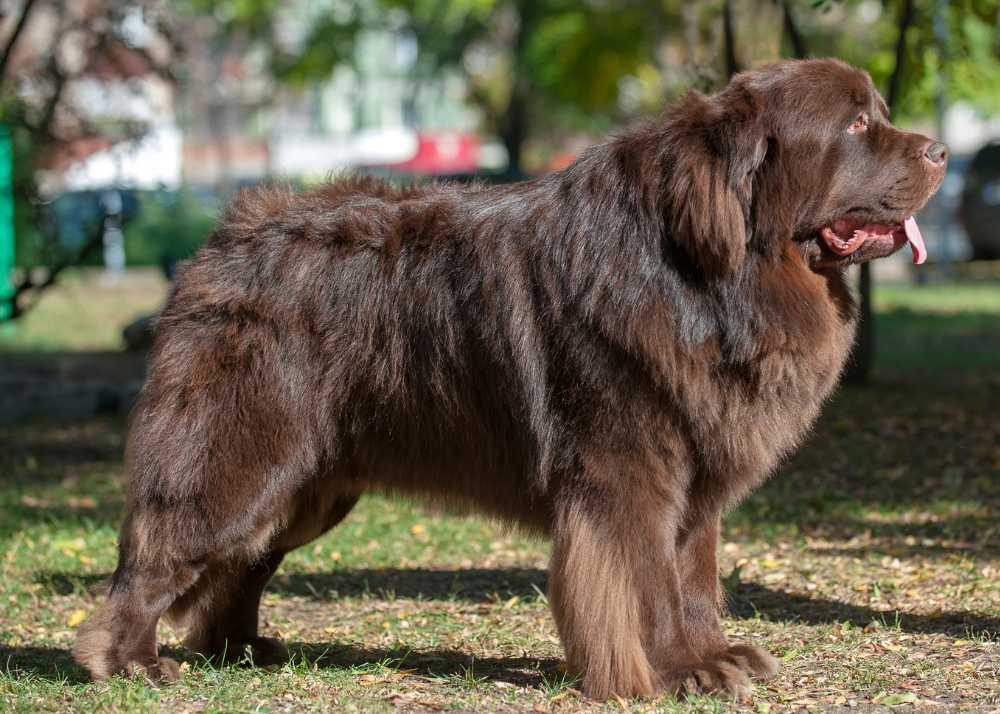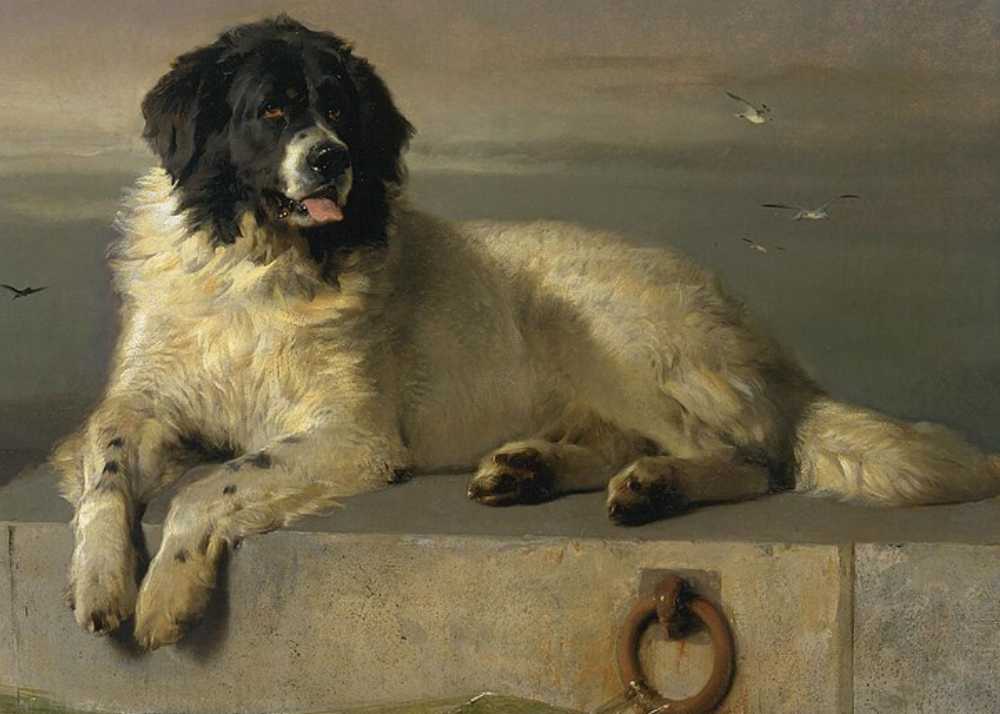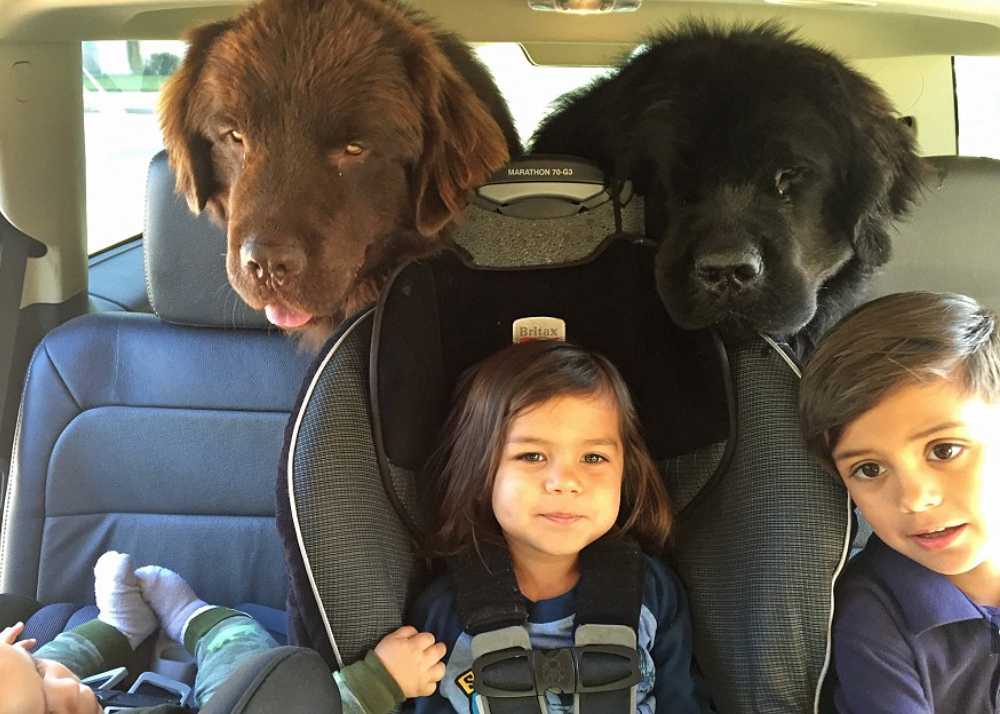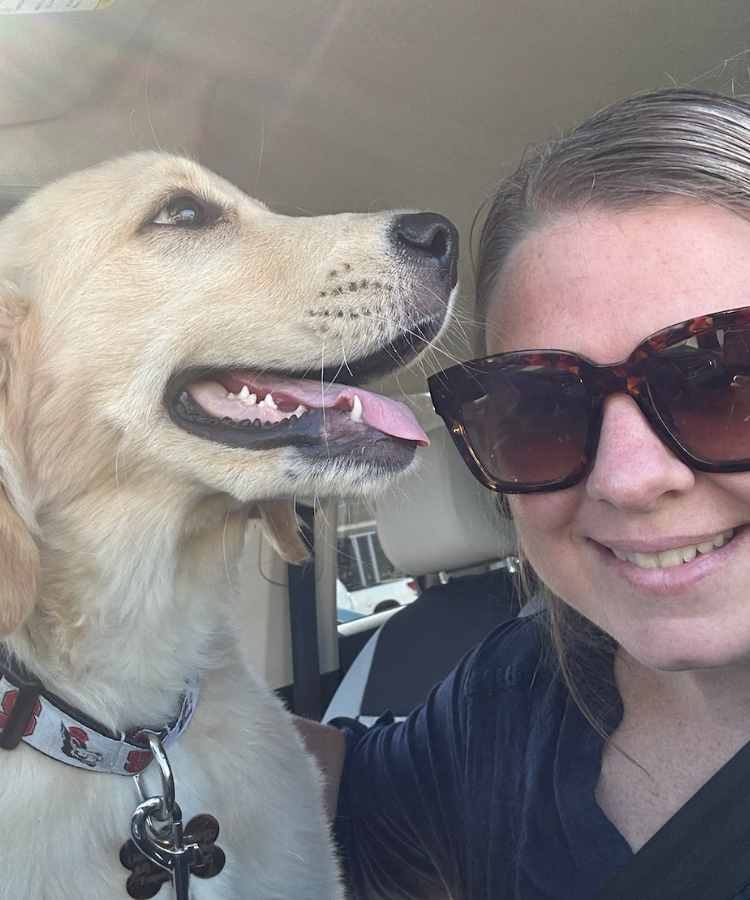A Newfoundland, also called a Newfie or Newfy, is a huge dog with a heart of gold. They are good-natured, calm dogs that become utterly devoted to their humans. Primarily bred to be a working dog, Newfoundlands have become excellent family companions over time.
While you may be intrigued, you may still have questions about owning Newfoundland puppies. What is the origin of the breed, and why are they named after a location? What is their personality like? What can I expect when living with a Newfoundland puppy? And most importantly, where can I find Newfoundland puppies from a trustworthy breeder?
If you’re looking for a devoted, gentle giant, you can’t go wrong with an excellent family dog like a Newfoundland puppy! Read on to find out everything there is to know about Newfoundland puppies and where to find one.
Where is a Newfoundland Puppy From?
The Newfoundland and Labrador province of Canada borders the Labrador Sea, a terrain of mountains and coastline with frigid ocean currents and strong western winds. The province hosts a range of temperatures, from polar tundra to the subarctic. Weather conditions can change in an instant thanks to fog, snow, rain, winds, and a combination of other factors to make life extremely difficult. It’s no surprise to learn that a dog named after Newfoundland is well equipped to withstand the harsh climate and frigid waters.
Newfoundland dogs and Labrador Retrievers have existed since around 4,000 years ago in this area according to dogs discovered in graves. Historical documents as early as 1620 mention these dogs as well. For centuries, fishermen used Newfoundlands as search-and-rescue dogs for those facing tragedy in the icy waters of the Atlantic Ocean. The Newfoundland was said to be strong enough to tow a man to the shore and built perfectly for the job thanks to its powerful muscles and partially webbed feet. Newfoundlands also hauled carts to and from markets and helped with dock activities like pulling in nets.
Famous Newfoundlands
A few Newfoundland dogs have held special places in people’s hearts, and it’s no wonder that Newfoundlands become famous and stand out from the rest of the pack. Several Newfoundlands have been credited with saving people’s lives in water-related accidents, such as people drowning or capsizing. Newfoundlands have conducted countless rescues, from seaside visitors to hundreds of shipwrecked sailors -- and even Napoleon Bonaparte. Newfoundlands have also been given as presents to visiting monarchs and gifts for royalty. One Newfoundland named Seaman traveled with the Lewis & Clark expedition for three years from the Mississippi River to the Pacific Ocean. He protected them from threats on the dangerous journey, and 10 statues remain honoring Seaman.
Napoleon and Van Hare
Starting in 1862, Napoleon the Wonder Dog, also called “Napoleon the Wizard Dog” or the “Thousand Guinea Dog Napoleon,” traveled throughout Europe as the star performer in George Van Hare’s Magic Circus. As one of the first circus acts in England, circusgoers delighted in the many tricks the nearly 200-lb. all-black dog could do. Napoleon could perform like a trick pony by leaping over bars, pretending to do magic tricks, “spelling” out answers to questions, dancing, and many other hilarious antics. Napoleon sadly passed away from an injury experienced on stage, but his spirit lives on as new rules regarding animals as circus performers aim to protect their welfare.
Today, people still enjoy water-based activities with Newfoundlands, including several water search-and-rescue events, dock diving, demonstrations, and more. You can still find charming Newfoundlands working alongside fishermen on boats, employed as therapy dogs, or lying beside the hearth watching over children.
What Does a Newfoundland Puppy Look Like?
A Newfoundland puppy is characterized by its impressive oily, thick waterproof coat, large bone structure, blocky head, huge, broad chest, and powerful legs. Their lips and jowls hang down their large muzzles. A kind, docile expression can usually be found on their giant faces. Newfoundlands are massive dogs starting at 100 pounds weighing up to 150+ pounds and standing 36-38 inches tall. Their deep chests contain lungs strong enough for strenuous rescues and physical activity.
A Distinguished Member of the Humane Society by Sir Edwin Landseer
Newfoundland puppies can be found in a few different colors: Black, brown, and gray are popular. The black and white Newfoundland is called a Landseer named after Sir Edwin Landseer, an artist who memorialized Newfoundlands with this color pattern in his work.
One unique feature of Newfoundland puppies is their webbed feet. Newfoundland dogs have long toes with webs in between them, forming a powerful propulsion mechanism to swim through the water in a down-and-out motion rather than like an ordinary dog. Their powerful swimming abilities alongside their physical strength and features have contributed to their incredible water rescue history.
What’s it Like to Live With Newfoundland Puppies?
Being a Newfoundland puppy owner is for a person who appreciates the quirks and endearing traits of the breed. These devoted, patient, and trusting dogs may be intimidating due to their size, but there is not an aggressive bone in their bodies. In fact, they are so sweet that the character trait is a signature hallmark of the breed standard.
The “Nanny Dog”
Newfoundlands have been given the nickname of the “Nanny Dog” because of their incredibly gentle temperament toward their families, especially children. They watch over them attentively without being fierce and guard them without being aggressive. In Barrie’s book Peter Pan, Nana the Newfoundland protected the nursery from harm and barked at Peter Pan’s shadow (Nana was a St. Bernard in the Disney version). Famous politicians have also had Newfoundlands as family dogs that watched over their children.
What type of living arrangements should I have for a Newfoundland puppy?
Newfoundland puppies are not dogs that fit every household – literally. Before becoming a Newfoundland puppy owner, you’ll have to assess your living space inside and out and even your vehicles.
These dogs shed heavily thanks to their thick double coats, especially when they blow their coats twice a year in spring and fall. Your space will need to be cleaned of hair, so consider if this is a daily chore you are willing to take on and if you have the proper tools to manage pet hair, like a nice vacuum cleaner. And if you or someone in your household suffers from allergies, this is not the dog for you, as Newfoundlands are not hypoallergenic.
Speaking of chores, Newfoundland dogs are prolific droolers thanks to their droopy, loose jowls and lips that hang down. They are also very messy drinkers, so expect some slobber to be a part of your life as well when picking out furniture, clothing, and flooring. Some Newfoundland owners keep a towel for slobber handy!
When looking for a safe space for your puppy, Newfoundland puppy owners will need to purchase a crate big enough to contain a rapidly growing giant Newfy puppy. Your puppy’s bed will also take up quite a bit of space. In addition to having enough space to house these two pieces of “furniture,” your Newfoundland will need room to navigate while inside and plenty of room to romp around outside on the leash or in an enclosed, secured area.
The Fisher family with their 3 kids and 2 Newfoundlands, courtesy of the Daily Mail
Do you want to go on adventures with your Newfy? Of course! One snag – do you have a vehicle big enough to transport not only your Newfoundland but also all of his things, plus all your family members? You’ll need a vehicle equipped to handle a large dog like a Newfoundland.
Grooming a Newfoundland puppy
Keeping a Newfoundland clean and tidy can be quite the feat, so learning what you can about grooming a Newfoundland dog is helpful before you become a Newfoundland puppy owner.
A Newfoundland’s impressive coat will need quite a bit of attention. These thick, medium-sized coats have an oily, coarse, waterproof outer layer and a soft, downy inner layer. These layers work together to protect the skin and regulate body temperature, so never shave off a Newfoundland’s coat!
Daily brushing is a must for Newfoundland puppy owners. This task may take quite some time, but it helps keep down on the shedding. You may choose to use a combination of a stainless steel comb, pinbrush, or undercoat rake to remove loose and dead hairs, redistribute oils, and prevent mats and tangles.
Having a big enough bathtub or shower to bathe your Newfy puppy could also be a challenge. Newfoundland puppies love to get wet and play in mud puddles – are you prepared to bathe them or hose them down with plenty of towels at the ready?
Proper paw care for dogs is crucial in keeping your extra large dog safe and pain-free. This means checking for scratches or tears and keeping their nails cut to the correct length.
How much activity does a Newfoundland puppy need?
Newfoundland puppies are fairly active dogs for their size. They do have their lazy side, too, but are generally up for doing what you’re doing. They’ll need anywhere from 30-60 minutes of exercise a day.
There are lots of fun ways to provide enough exercise and activity for your Newfoundland puppy by breaking it up throughout the day. They love to swim and are naturals in bodies of water. They also like to pull heavy loads. Walking around the blocks, socializing at the dog park, playing fetch, and interacting with mentally enriching toys will help keep them occupied.
Because they are large dogs, Newfoundland puppies have bigger bones that don’t fully form until 18-24 months. For this reason, you should make sure they do not over-exert themselves, especially when engaging in tough tasks. Their joints and bones are still developing, and they could become seriously injured if they are a bit too active.
Training a Newfoundland puppy
Newfoundland puppies are generally easy to train, but they need patience and consistency. Due to their large size, you’ll need to begin training from Day One so they can learn to control themselves and follow commands without harming other dogs and children in their excitement (never maliciously, as that’s not in the breed).
Newfoundland puppies are generally eager to please and responsive to training sessions. Using rewards-based techniques over harsh ones is preferred since Newfoundland puppies can be sensitive.
Canine members of the working group were bred to do jobs like protect, guard, search and rescue, pull carts, and other tasks to help humans by using their strength. Giving your Newfoundland puppy a “job” to do, no matter how insignificant it may be to you, will help boost their confidence and stay out of trouble.
If you are going to train them for water-based sports, it’s best to begin the fundamental training and begin more specialized training around 4-6 months. Newfoundland puppies also make great therapy dogs, so exposure to different experiences, sounds, and people is crucial in those early months for a well-adjusted dog.
Caring For Newfoundland Puppies
Caring for Newfoundland puppies will take some effort (and money) to put their well-being first. As a Newfoundland puppy owner, you should know about how to care for your puppy and awareness of health concerns in Newfoundland dogs. Remember to take a look at your budget to set aside money for their care so you are financially prepared to care for your dog. Because they are so large, everything will also cost extra, such as food, medicines, crates, and even vehicles to transport them and a house with enough space.
Newfoundland puppies grow up to live 9-10 years with proper care. Newfoundland puppy owners can take steps to ensure their puppies stay as healthy as possible and prevent or reduce health issues. Keep them on schedule with regular vet visits and flea, tick, and heartworm prevention. Feeding them a nutritious diet, limiting treats, and giving them plenty of exercise will help prolong their life.
While Newfoundlands are generally robust, you should be aware of a few possible health conditions associated with this large dog breed to monitor your puppy’s health.
- Bloat (Gastric Dilatation-Volvulus, GDV): Bloat is a life-threatening event where the stomach fills with gas and twists on itself, cutting off the blood supply. It requires immediate medical attention and surgery. Sometimes surgery will be performed that keeps the stomach in place to prevent future twisting.
- Osteosarcoma: This cancer of the bone is malignant and painful. Watch for signs of swelling, loss of appetite, mobility trouble, and mass or lumps on your Newfoundland.
- Dilated cardiomyopathy (DCM): DCM is when the left ventricle muscle degenerates and becomes thin and weak. It can worsen over time and lead to congestive heart failure.
- Hip & Elbow Dysplasia: An improper fit of the elbow or hip joint due to a hereditary condition leads to pain and arthritis. Ensure your Newfoundland’s hips, elbows, and other joints are checked at regular appointments.
Where Can I Find Newfoundland Puppies?
Convinced this is the breed for you? Great! Now you’ll be searching for Newfoundland puppies nearby, but you may be disappointed in what you find.
Because this breed is a little more difficult to find than a more well-known dog like a doodle or retriever, you’ll come across many sites and posts promising low prices but no paperwork. They will ask for payment in cash, MoneyGram, or unsecured apps like Zelle. Often, these dogs will come with no veterinary records, bill of sale, or a puppy contract – and they certainly won’t come with any sort of health guarantee.
Run from these social media and message board posts! If your gut says it’s a scam, then pay attention to the red flags and turn to Pawrade.
Pawrade offers Newfoundland puppies
At Pawrade, you will never have to worry about being scammed. We are real people who are dog lovers just like you who can’t wait to help you on your journey to becoming a Newfoundland puppy owner.
We only partner with hand-selected, pre-screened Newfoundland puppy breeders who pass our application process and rigorous standards. Our trustworthy breeder partners understand the nuance and care required for this delightful large dog and will get them started on the right paw in life.
Each puppy is covered under a comprehensive 3-year health guarantee, a puppy contract, 30 days of MetLife insurance, proof of sale, a health certificate, and other information provided by the breeder, such as possible registration papers. All of the journey is documented in a secure transaction management system offering protection and security for everyone involved.
Our Pawrade team members are ready to help you select Newfoundland puppies for sale and begin the process of making them your very own gentle giant. Contact us today to begin your stress-free Newfoundland ownership experience.
